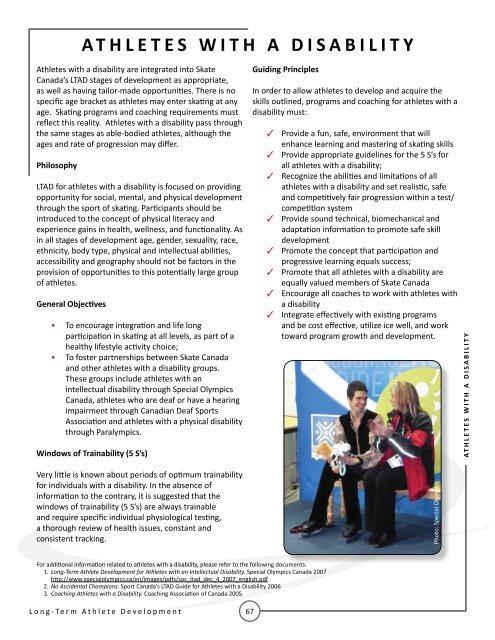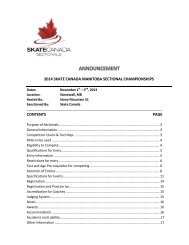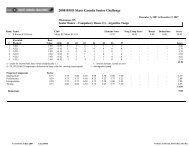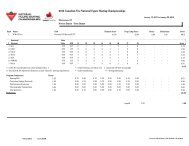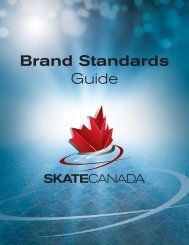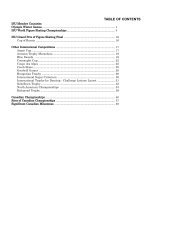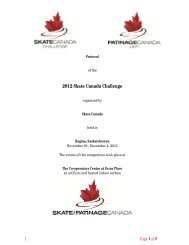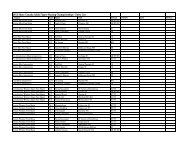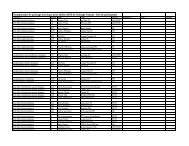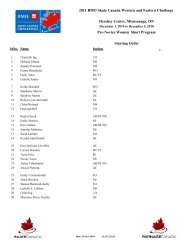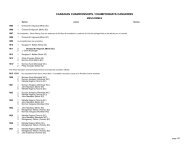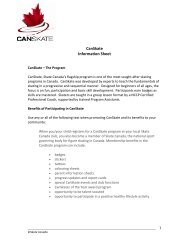LONG-TERM ATHLETE DEVELOPMENT - Skate Canada
LONG-TERM ATHLETE DEVELOPMENT - Skate Canada
LONG-TERM ATHLETE DEVELOPMENT - Skate Canada
Create successful ePaper yourself
Turn your PDF publications into a flip-book with our unique Google optimized e-Paper software.
Athletes with a disability are integrated into <strong>Skate</strong><br />
<strong>Canada</strong>’s LTAD stages of development as appropriate,<br />
as well as having tailor-made opportunities. There is no<br />
specific age bracket as athletes may enter skating at any<br />
age. Skating programs and coaching requirements must<br />
reflect this reality. Athletes with a disability pass through<br />
the same stages as able-bodied athletes, although the<br />
ages and rate of progression may differ.<br />
Philosophy<br />
LTAD for athletes with a disability is focused on providing<br />
opportunity for social, mental, and physical development<br />
through the sport of skating. Participants should be<br />
introduced to the concept of physical literacy and<br />
experience gains in health, wellness, and functionality. As<br />
in all stages of development age, gender, sexuality, race,<br />
ethnicity, body type, physical and intellectual abilities,<br />
accessibility and geography should not be factors in the<br />
provision of opportunities to this potentially large group<br />
of athletes.<br />
General Objectives<br />
A T H L E T E S W I T H A D I S A B I L I T Y<br />
• To encourage integration and life long<br />
participation in skating at all levels, as part of a<br />
healthy lifestyle activity choice;<br />
• To foster partnerships between <strong>Skate</strong> <strong>Canada</strong><br />
and other athletes with a disability groups.<br />
These groups include athletes with an<br />
intellectual disability through Special Olympics<br />
<strong>Canada</strong>, athletes who are deaf or have a hearing<br />
impairment through Canadian Deaf Sports<br />
Association and athletes with a physical disability<br />
through Paralympics.<br />
Windows of Trainability (5 S’s)<br />
Very little is known about periods of optimum trainability<br />
for individuals with a disability. In the absence of<br />
information to the contrary, it is suggested that the<br />
windows of trainability (5 S’s) are always trainable<br />
and require specific individual physiological testing,<br />
a thorough review of health issues, constant and<br />
consistent tracking.<br />
L o n g - Te r m A t h l e t e D e v e l o p m e n t<br />
865 Sheord Road, Ottawa, Ontario K1J 1H9<br />
Phone 613.747.1007 I Toll Free 1.888.747.2372 I Fax 613.748.5718 I Toll Free Fax 1.877.211.2372<br />
67<br />
Guiding Principles<br />
For additional information related to athletes with a disability, please refer to the following documents:<br />
1. Long-Term Athlete Development for Athletes with an Intellectual Disability. Special Olympics <strong>Canada</strong> 2007<br />
http://www.specialolympics.ca/en/images/pdfs/soc_ltad_dec_4_2007_english.pdf<br />
2. No Accidental Champions. Sport <strong>Canada</strong>’s LTAD Guide for Athletes with a Disability 2006<br />
3. Coaching Athletes with a Disability. Coaching Association of <strong>Canada</strong> 2005<br />
In order to allow athletes to develop and acquire the<br />
skills outlined, programs and coaching for athletes with a<br />
disability must:<br />
3 Provide a fun, safe, environment that will<br />
enhance learning and mastering of skating skills<br />
3 Provide appropriate guidelines for the 5 S’s for<br />
all athletes with a disability;<br />
3 Recognize the abilities and limitations of all<br />
athletes with a disability and set realistic, safe<br />
and competitively fair progression within a test/<br />
competition system<br />
3 Provide sound technical, biomechanical and<br />
adaptation information to promote safe skill<br />
development<br />
3 Promote the concept that participation and<br />
progressive learning equals success;<br />
3 Promote that all athletes with a disability are<br />
equally valued members of <strong>Skate</strong> <strong>Canada</strong><br />
3 Encourage all coaches to work with athletes with<br />
a disability<br />
3 Integrate effectively with existing programs<br />
and be cost effective, utilize ice well, and work<br />
toward program growth and development.<br />
Photo: Special Olympics<br />
A T H L E T E S W I T H A D I S A B I L I T Y


